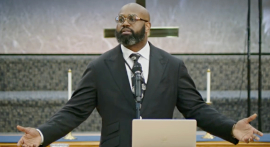
The first part of the State of Discipleship study conducted by Lifeway Research examined how U.S. Protestant pastors understand discipleship and how they believe it should best occur.
The survey included 2,620 Protestant pastors and was carried out from September 10 to 30, 2024. The responses from 2,176 Baptist pastors were weighted to accurately represent their proportion among Protestant churches.
While 52 percent of pastors are satisfied with discipleship and spiritual formation in their churches, only 8 percent strongly agree with this sentiment. Similarly, 52 percent report having an intentional plan for discipling individuals and encouraging their spiritual growth.
Additionally, 71 percent believe there are ways to measure discipleship within a congregation, but only 30 percent say their churches currently have specific methods for doing so, with just 5 percent strongly agreeing.
When asked about the core concepts of discipleship, pastors mentioned various elements. The most common responses were spiritual growth or discipline (12 percent) and Bible study or Scripture memorization (10 percent). Some also highlighted mentoring or meetings one-on-one (7 percent), teaching or training (6 percent), prayer (6 percent), making disciples (5 percent), and small groups (5 percent).
Pastors are divided on what should be the main focus of their church’s discipleship activities. Nearly half (46 percent) prioritize biblical knowledge, while 38 percent emphasize relationship building and encouragement. Fewer pastors emphasize equipping and “how-to” aspects (9 percent) or experience and service (5 percent).
Around 89 percent of Protestant pastors report using sermons during weekly worship services as a key method of discipleship and to promote the spiritual growth of adults in their congregations. Additionally, most churches offer adult Sunday School classes (69 percent), small group Bible studies for adults (62 percent), women’s groups or classes (57 percent), and pastor-led teaching sessions such as those on Sunday or Wednesday evenings (54 percent).
Fewer churches emphasize men’s groups or classes (45 percent), study groups available to all adults (42 percent), or mentoring and coaching relationships (31 percent). About 14 percent of churches specifically utilize accountability groups
About a third (33 percent) of pastors consider the weekly sermon to be the most important element for their adult discipleship efforts. Nearly 1 in 6 prioritize adult small group Bible studies (18 percent) or adult Sunday School (18 percent). Around 10 percent highlight pastor-led teaching outside of Sunday mornings as a priority.
Most churches target discipleship programs for middle and high school students (57 percent) and elementary children (57 percent). Approximately a third also offer programs for young adults (36 percent) and preschoolers (34 percent). Around 21 percent have targeted programs for college-aged adults. Nearly 1 in 7 (14 percent) report not having any targeted spiritual growth programs for these groups.
“Among all Protestant churches, more than a quarter have decentralized discipleship plans for ministries, less than a quarter have a single discipleship plan for their whole church, and around half do not have an intentional discipleship plan,” said Scott McConnell, executive director of Lifeway Research.
Almost all pastors (95 percent) agree that discipleship is not primarily achieved through a program but through relationships. Most also believe that such relationships should include physical presence. Only 22 percent think discipleship can be equally effective virtually, while 75 percent disagree.
Seven in ten U.S. Protestant pastors believe discipleship is most effective one-on-one or in groups of no more than five people. Specifically, 40 percent say small groups of two to five believers are ideal, while 29 percent focus on one believer discipling another individually. An additional 17 percent emphasize small groups of six to 25 believers.



















